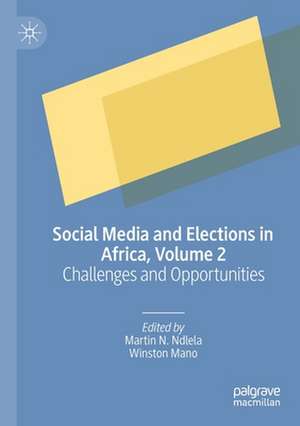Social Media and Elections in Africa, Volume 2: Challenges and Opportunities
Editat de Martin N. Ndlela, Winston Manoen Limba Engleză Paperback – 26 aug 2021
| Toate formatele și edițiile | Preț | Express |
|---|---|---|
| Paperback (1) | 694.37 lei 6-8 săpt. | |
| Springer International Publishing – 26 aug 2021 | 694.37 lei 6-8 săpt. | |
| Hardback (1) | 704.17 lei 6-8 săpt. | |
| Springer International Publishing – 15 feb 2020 | 704.17 lei 6-8 săpt. |
Preț: 694.37 lei
Preț vechi: 816.90 lei
-15% Nou
Puncte Express: 1042
Preț estimativ în valută:
132.91€ • 144.42$ • 111.72£
132.91€ • 144.42$ • 111.72£
Carte tipărită la comandă
Livrare economică 21 aprilie-05 mai
Preluare comenzi: 021 569.72.76
Specificații
ISBN-13: 9783030326845
ISBN-10: 3030326845
Pagini: 274
Ilustrații: XV, 274 p. 6 illus. in color.
Dimensiuni: 148 x 210 mm
Greutate: 0.35 kg
Ediția:1st ed. 2020
Editura: Springer International Publishing
Colecția Palgrave Macmillan
Locul publicării:Cham, Switzerland
ISBN-10: 3030326845
Pagini: 274
Ilustrații: XV, 274 p. 6 illus. in color.
Dimensiuni: 148 x 210 mm
Greutate: 0.35 kg
Ediția:1st ed. 2020
Editura: Springer International Publishing
Colecția Palgrave Macmillan
Locul publicării:Cham, Switzerland
Cuprins
Chapter 1: Introduction - Social Media, Political Cultures and Elections in Africa Winston Mano & Martin Ndlela.- Chapter 2: Misogyny, Social Media and Electoral Democracy in Zimbabwe’s 2018 Elections Pauline Mateveke and Rosemary Chikafa-Chipiro.- Chapter 3: Women and Election Activism in Uganda: The Pads4Girls Social Media Campaign Florence Namasinga Selnes and Kristin Skare Orgeret.- Chapter 4: Discrimination against female politicians on social media: An analysis of tweets in the run-up to the July 2018 harmonised elections in Zimbabwe. Gibson Ncube and Gwatisira Yemurai.- Chapter 5: Young people, social media and political participation. The limits of discursive (in)civility in the Kenyan context, Martin Ndlela.- Chapter 6: Youth, elections and social media: Understanding the critical (di)stance between young people and political party messaging. Vanessa Malilaand Noko Pela.- Chapter 7: Social Media as New Source of Empowerment in Algeria - Laeed Zaghlami.- Chapter 8: Post digital dialogue and activism in the public sphere. Dalien René Benecke and Sonja Verwey.- Chapter 9: #ThisFlag: Social media and cyber-protests in Zimbabwe Shepherd Mpofu and Admire Mare.- Chapter 10: #Zuma Must Fall this February: Homophily on the echo chambers of political leaders’ twitter accounts Rofhiwa Mukhudwana.- Chapter 11: An Analysis of Newspapers’ Coverage of Hate Speech in Nigeria. Sunday Ogbonna and Achike, C. Okafo.- Chapter 12: A critical analysis of how transgressive social media images and memes portrayed dominant political discourses during Nigeria’s 2015 General Elections Chikezie E Uzuegbunam.- Chapter 13: Discourses on negative political advertising in South Africa: a social media reception analysis Siyasanga M Tyali & Rofhiwa F Mukhudwana.
Notă biografică
Martin N. Ndlela is Associate Professor at the School of Business and Social Sciences, Inland Norway University of Applied Sciences, and Research Associate at the Department of Strategic Communication at the University of Johannesburg, South Africa. He is a co-editor of the Journal of African Media Studies.
Winston Mano is Reader at the University of Westminster, UK, and member of the Communication Research Institute’s Global Media Research Network. Mano is also the Principal Editor of the Journal of African Media Studies and a Senior Research Fellow at the University of Johannesburg, South Africa.
Winston Mano is Reader at the University of Westminster, UK, and member of the Communication Research Institute’s Global Media Research Network. Mano is also the Principal Editor of the Journal of African Media Studies and a Senior Research Fellow at the University of Johannesburg, South Africa.
Textul de pe ultima copertă
This book, the second of two volumes, explores the challenges and opportunities presented by the increased presence of social media within African politics. Electoral processes in Africa have assumed new dimensions due to the influence of social media. As social media permeates different aspects of elections, it is ostensibly creating new challenges and opportunities. Most evident are the challenges of hate speech, misogyny and incivility. This book considers the impact of digital media before, during, and after elections, as well as authorities' attempts to legislate and regulate the internet in response. Contributions to this volume analyse social media posts, transgressive images, newspaper articles, and include case studies of Algeria, Zimbabwe, Kenya, South Africa, Nigeria and Uganda. This results in the delivery of an original depiction of the use of social media in a variety of African contexts. This book will appeal to academics and students of media and communication studies,political studies, journalism, sociology, and African studies.
Caracteristici
Explores the challenges and opportunities presented by the increased presence of social media within African politics Analyses social media posts, transgressive images, newspaper articles, and includes case studies of Algeria, Zimbabwe, Kenya, South Africa, Nigeria and Uganda Considers the impact of digital media before, during, and after elections
